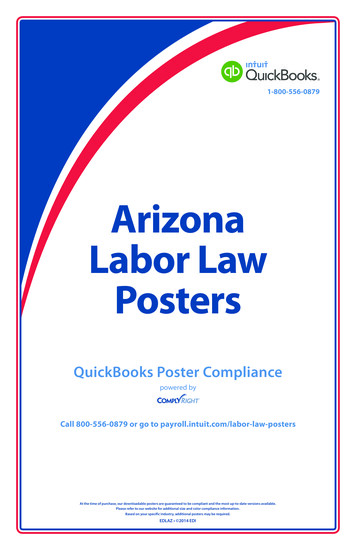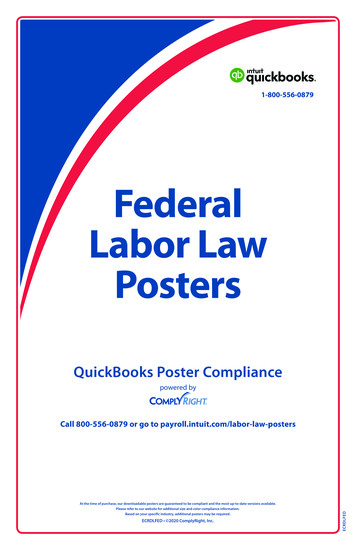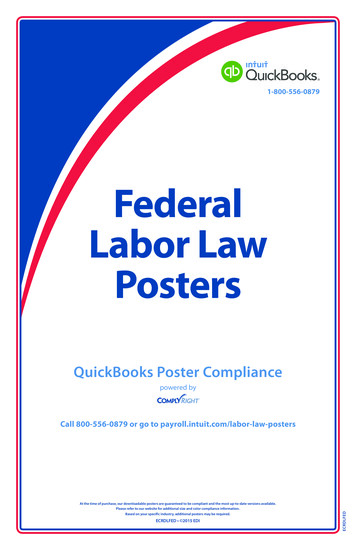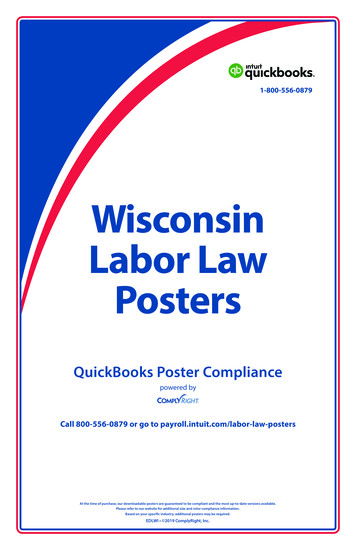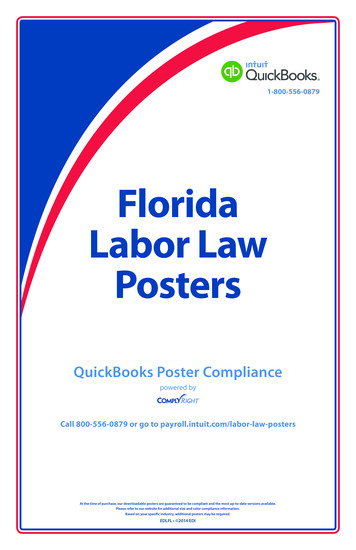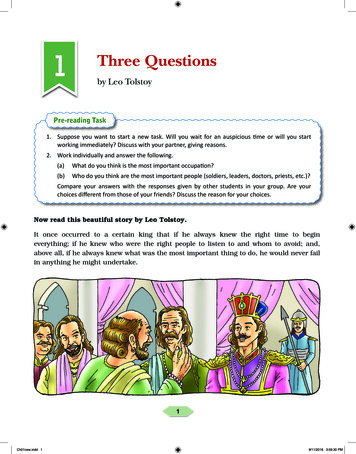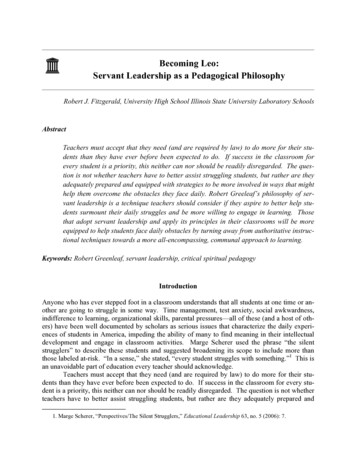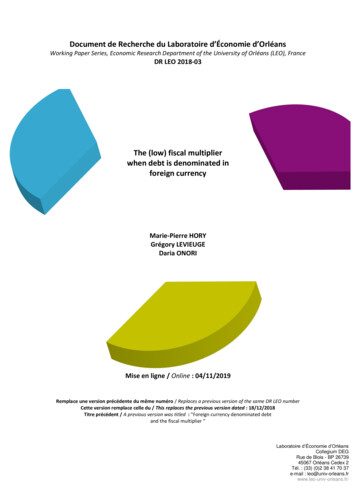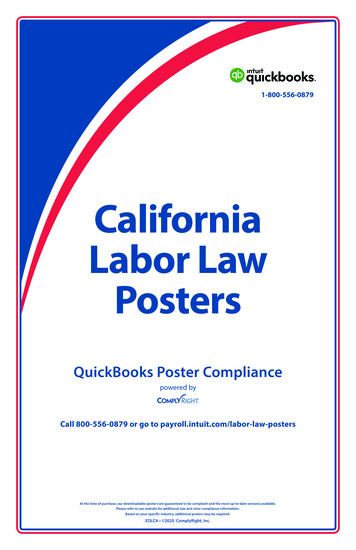
Transcription
1-800-556-0879CaliforniaLabor LawPostersQuickBooks Poster Compliancepowered byCall 800-556-0879 or go to payroll.intuit.com/labor-law-postersAt the time of purchase, our downloadable posters are guaranteed to be compliant and the most up-to-date versions available.Please refer to our website for additional size and color compliance information.Based on your specific industry, additional posters may be required.EDLCA 2020 ComplyRight, Inc.
FAIR EMPLOYMENTCALIFORNIA LAWPROHIBITS WORKPLACEDISCRIMINATION & HARASSMENTTHE DEPARTMENT OF FAIR EMPLOYMENT AND HOUSINGTHE MISSION OF THE DEPARTMENT OF FAIR EMPLOYMENTAND HOUSING IS TO PROTECT THE PEOPLE OF CALIFORNIAFROM UNLAFUL DISCRIMINATION IN EMPLOYMENT, HOUSINGAND PUBLIC ACCOMODATIONS, AND FROM THE PERPETRATIONOF ACTS OF HATE VIOLENCE AND HUMAN TRAFFICKING.The California Department of Fair Employment and Housing (DFEH) enforces laws that protect you from illegal discriminationand harrasment in employment based on your actual or perceived: ANCESTRY AGE (40 and above) COLOR DISABILITY (physical, mental, HIV and AIDS) GENETIC INFORMATION GENDER IDENTITY, GENDER EXPRESSION MARITAL STATUS MEDICAL CONDITION (genetic characteristics, cancer ora record or history of cancer) MILITARY OR VETERAN STATUS NATIONAL ORIGIN (includes language use and possessionof a driver’s license issued to persons unable to provetheir presence in the United States is authorized underfederal law) RACE (including, but not limited to, hair texture andprotective hairstyles. Protective hairstyles includes, but isnot limited to, such hairstyles as braids, locks, and twists) RELIGION (includes religious dress andgrooming practices) SEX/GENDER (includes pregnancy, childbirth,breastfeeding and/or related medical conditions) SEXUAL ORIENTATIONTHE CALIFORNIA FAIR EMPLOYMENT AND HOUSING ACT (GOVERNMENT CODE SECTIONS 12900 THROUGH 12996) AND ITSIMPLEMENTING REGULATIONS (CALIFORNIA CODE OF REGULATIONS,TITLE 2, SECTIONS 11000 THROUGH 11141):13. Require employment agencies to serve all applicants equally, refusediscriminatory job orders, and prohibit employers and employment agenciesfrom making discriminatory pre-hiring inquiries or publishing help-wantedadvertisements that express a discriminatory hiring preference.14. Prohibit unions from discriminating in member admissions or dispatchingmembers to jobs.15. Prohibit retaliation against a person who opposes, reports, or assists anotherperson to oppose unlawful discrimination.FILING A COMPLAINTThe law provides for remedies for individuals who experience prohibited discriminationor harassment in the workplace. These remedies include hiring, front pay, back pay,promotion, reinstatement, cease-and-desist orders, expert witness fees, reasonableattorney’s fees and costs, punitive damages, and emotional distress damages.Job applicants, unpaid interns, and employees: If you believe you have experienceddiscrimination or harassment you may file a complaint with DFEH. Independentcontractors and volunteers: If you believe you have been harassed, you may file acomplaint with DFEH.Complaints must be filed within three years* of the last act of discrimination/harassment.For victims who are under the age of eighteen, not later than three years after the last act ofdiscrimination/harassment or one year after the victim’s eighteenth birthday, whichever is later.To schedule an appointment, contact the Communication Center below.If you have a disability that requires a reasonable accommodation, the DFEH can assist youby scribing your intake by phone or, for individuals who are Deaf or Hard of Hearing or havespeech disabilities, through the California Relay Service (711), or you can contact us below.DFEH is committed to providing access to our materials in an alternative format as areasonable accommodation for people with disabilities when requested.Government Code section 12950 and California Code of Regulations, title 2, section 11013, requireall employers to post this document. It must be conspicuously posted in hiring offices, on employeebulletin boards, in employment agency waiting rooms, union halls, and other places employeesgather. Any employer whose workforce at any facility or establishment consists of more than 10% ofnon-English speaking persons must also post this notice in the appropriate language or languages.CONTACT USToll Free: (800) 884-1684TTY: (800) Effective 1/1/2020EDLCA1A 12/19DFEH-E07P-ENG / December 2019EDLCA1. Prohibit harassment of employees, applicants, unpaid interns, volunteers, andindependent contractors by any persons and require employers to take allreasonable steps to prevent harassment. This includes a prohibition againstsexual harassment, gender harassment, harassment based on pregnancy,childbirth, breastfeeding and/or related medical conditions, as well asharassment based on all other characteristics listed above.2. Require that all employers provide information to each of their employeeson the nature, illegality, and legal remedies that apply to sexual harassment.Employers may either develop their own publications, which must meetstandards set forth in California Government Code section 12950, or usematerial from DFEH.3. Require employers with 5 or more employees and all public entities to providetraining for all employees regarding the prevention of sexual harassment, includingharassment based on gender identity, gender expression, and sexual orientation.4. Prohibit employers from limiting or prohibiting the use of any language in anyworkplace unless justified by business necessity. The employer must notifyemployees of the language restriction and consequences for violation. Alsoprohibits employers from discriminating against an applicant or employeebecause they possess a driver’s license issued to a person who is unable toprove that their presence in the United States is authorized under federal law.5. Require employers to reasonably accommodate an employee, unpaid intern, orjob applicant’s religious beliefs and practices, including the wearing or carryingof religious clothing, jewelry or artifacts, and hair styles, facial hair, or body hair,which are part of an individual’s observance of their religious beliefs.6. Require employers to reasonably accommodate employees or job applicantswith disabilities to enable them to perform the essential functions of a job.7. Permit job applicants, unpaid interns, volunteers, and employees to filecomplaints with DFEH against an employer, employment agency, or labor unionthat fails to grant equal employment as required by law.8. Prohibit discrimination against any job applicant, unpaid intern, or employee inhiring, promotions, assignments, termination, or any term, condition, or privilegeof employment.9. Require employers, employment agencies, and unions to preserve applications,personnel records, and employment referral records for a minimum of two years.10. Require employers to provide leaves of up to four months to employeesdisabled because of pregnancy, childbirth, or a related medical condition.11. Require an employer to provide reasonable accommodations requestedby an employee, on the advice of their health care provider, related to theirpregnancy, childbirth, or a related medical condition.12. Require employers of 20 or more persons to allow eligible employees to takeup to 12 weeks leave in a 12-month period for the birth of a child or theplacement of a child for adoption or foster care; also require employers of 50or more persons to allow eligible employees to take up to 12 weeks leave ina 12-month period for an employee’s own serious health condition or to carefor a parent, spouse, or child with a serious health condition.
PAID SICK LEAVEDivision of Labor Standards EnforcementOffice of the Labor CommissionerTHIS POSTER MUST BE DISPLAYED WHERE EMPLOYEES CAN EASILY READ IT(Poster may be printed on 8 ½” x 11” le er size paper)HEALTHY WORKPLACES/HEALTHY FAMILIES ACT OF 2014PAID SICK LEAVEEntitlement: An employee who, on or after July 1, 2015, works in California for 30 or moredays within a year from the beginning of employment is entitled to paid sickleave. Paid sick leave accrues at the rate of one hour per every 30 hours worked, paidat the employee’s regular wage rate. Accrual shall begin on the first day ofemployment or July 1, 2015, whichever is later. Accrued paid sick leave shall carry over to the following year of employment andmay be capped at 48 hours or 6 days. However, subject to specified conditions,if an employer has a paid sick leave, paid leave or paid time off policy (PTO) thatprovides no less than 24 hours or three days of paid leave or paid time off, noaccrual or carry over is required if the full amount of leave is received at thebeginning of each year in accordance with the policy.Usage: An employee may use accrued paid sick days beginning on the 90th day ofemployment. An employer shall provide paid sick days upon the oral or written request of anemployee for themselves or a family member for the diagnosis, care or treatmentof an existing health condition or preventive care, or specified purposes for anemployee who is a victim of domestic violence, sexual assault, or stalking. An employer may limit the use of paid sick days to 24 hours or three days in eachyear of employment.Retaliation or discrimination against an employee who requests paid sick days or usespaid sick days or both is prohibited. An employee can file a complaint with the LaborCommissioner against an employer who retaliates or discriminates against theemployee.For additional information you may contact your employer or the local office of the Labor Commissioner. Locatethe office by looking at the list of offices on our website http://www.dir.ca.gov/dlse/DistrictOffices.htm using thealphabetical listing of cities, locations, and communities. Staff is available in person and by telephone.EDLCA1G 12/14EDLCADLSE Paid Sick Leave Pos ng
UNEMPLOYMENT INSURANCENotice to Employees:THIS EMPLOYER IS REGISTERED WITH THE EMPLOYMENT DEVELOPMENTDEPARTMENT (EDD) AS REQUIRED BY THE CALIFORNIA UNEMPLOYMENTINSURANCE CODE AND IS REPORTING WAGE CREDITS TO THE EDD THAT AREBEING ACCUMULATED FOR YOU TO BE USED AS A BASIS FOR:Unemployment Insurance(funded entirely by employers’ taxes)Unemployment Insurance (UI) is paid for by your employer and provides partial income replacement when youare unemployed or your hours are reduced due to no fault of your own. To claim UI benefit payments you mustalso meet all UI eligibility requirements, including that you must be available for work and searching for work.How to File a New UI ClaimUse one of the following methods: Online: UI OnlineSM is the fastest and most convenient way to file your UI claim. Visitwww.edd.ca.gov/UI Online to get started. Phone: Representatives are available at the following toll-free numbers, Monday through Friday between8 a.m. to 12 noon (Pacific Standard Time) except during state holidays.English 1-800-300-5616Cantonese 1-800-547-3506Vietnamese 1-800-547-2058Spanish 1-800-326-8937Mandarin 1-866-303-0706TTY1-800-815-9387 Fax or Mail: When accessing UI Online to file a new claim, some customers will be instructed to fax ormail their UI application to the EDD. If this occurs, the Unemployment Insurance Application, DE 1101I,will display. For faster and more secure processing, fax the completed form to the number listed on the form.If mailing your UI application, use the address on the form and allow additional time for processing.Important: Waiting to file your UI claim may delay benefit payments.Disability Insurance(funded entirely by employees’ contributions)Disability Insurance (DI) is funded by employees’ contributions and provides partial wage replacement benefits toeligible Californians who are unable to work due to a non-work-related illness, injury, pregnancy, or disability.Your employer must provide the Disability Insurance Provisions, DE 2515 brochure, to newly hired employees andto each employee who is unable to work due to a non-work-related illness, injury, pregnancy, or disability.How to File a New DI ClaimUse one of the following methods: Online: SDI Online is the fastest and most convenient way to file your claim. Visitwww.edd.ca.gov/SDI Online to get started. Mail: To file a claim with the EDD by mail, complete and submit a Claim for Disability Insurance (DI) Benefits,DE 2501 form. You can obtain a paper claim form from your employer, physician/practitioner, visiting a StateDisability Insurance office, online at www.edd.ca.gov/Forms, or by calling 1-800-480-3287.Note: If your employer maintains an approved Voluntary Plan for DI coverage, contact your employer for assistance.For more information about DI, visit www.edd.ca.gov/disability or call 1-800-480-3287.State government employees should call 1-866-352-7675.TTY (for deaf or hearing-impaired individuals only) is available at 1-800-563-2441.Paid Family Leave(funded entirely by employees’ contributions)Paid Family Leave (PFL) is funded by employees’ contributions and provides partial wage replacement benefitsto eligible Californians who need time off work to care for seriously ill child, parent, parent-in-law, grandparent,grandchild, sibling, spouse, or registered domestic partner. Benefits are also available to parents who need time offwork to bond with a new child entering the family by birth, adoption, or foster care placement.Your employer must provide the Paid Family Leave, DE 2511 brochure, to newly hired employees and to eachemployee who is taking time off work to care for a seriously ill family member or to bond with a new child.How to File a New PFL ClaimUse one of the following methods: Online: SDI Online is the fastest and most convenient way to file your claim. Visitwww.edd.ca.gov/SDI Online to get started. Mail: To file a claim with the EDD by mail, complete and submit a Claim for Paid Family Leave (PFL) Benefits,DE 2501F form. You can obtain a paper claim form from your employer, a physician/practitioner, visiting aState Disability Insurance office, online at www.edd.ca.gov/Forms, or by calling 1-877-238-4373.Note: If your employer maintains an approved Voluntary Plan for PFL coverage, contact your employer for assistance.For more information about PFL, visit www.edd.ca.gov/disability or call 1-877-238-4373.State government employees should call 1-877-945-4747.TTY (for deaf or hearing-impaired individuals only) is available at 1-800-445-1312.Note: Some employees may be exempt from coverage by the above insurance programs. It is illegal to make afalse statement or to withhold facts to claim benefits. For additional general information, visit the EDDwebsite at www.edd.ca.gov.ERPage 1 of 1EDLCA1F 12/18GA 888/CUEDLCADE 1857A Rev. 43 (5-18)
NOTICE OBLIGATIONS AS AN EMPLOYEE:FAMILY CARE &MEDICAL LEAVE& PREGNANCYDISABILITYLEAVEUnder the California Family Rights Act of 1993you may have a right to a family care or medicalleave for the birth, adoption, or foster careplacement of your child or for your own serioushealth condition or that of your child, parent orspouse. California law also prohibits employersfrom denying or interfering with requests forPregnancy Disability Leave.Under the California Family Rights Act of 1993 (CFRA), if youhave more than 12 months of service with us and haveworked at least 1,250 hours in the 12-month period before thedate you want to begin your leave, and if we employ 50 or moreemployees at your worksite or within 75 miles of your worksite,you may have a right to a family care or medical leave (CFRAleave). This leave may be up to 12 workweeks in a 12-monthperiod for the birth, adoption, or foster care placement of yourchild or for your own serious health condition or that of your child,parent or spouse. If we employ less than 50 employees at yourworksite or within 75 miles of your worksite, but at least 20employees at your worksite or within 75 miles of your worksite,you may have a right to a family care leave for the birth,adoption, or foster care placement of your child under the NewParent Leave Act (NPLA). Similar to CFRA leave, the NPLAleave may be up to 12 workweeks in a 12-month period. Whilethe law provides only unpaid leave, employees may choose oremployers may require use of accrued paid leave while takingCFRA leave under certain circumstances and employees maychoose to use accrued paid leave while taking NPLA leave.Even if you are not eligible for CFRA or NPLA leave, if youare disabled by pregnancy, childbirth or a related medicalcondition, you are entitled to take a pregnancy disabilityleave of up to four months, depending on your period(s) ofactual disability. If you are CFRA or NPLA-eligible, you havecertain rights to take BOTH a pregnancy disability leaveand a CFRA or NPLA leave for reason of the birth of yourchild. Both leaves contain a guarantee of reinstatement-forpregnancy disability it is to the same position and forCFRA or NPLA it is to the same or a comparable positionat the end of the leave, subject to any defense allowedunder the law.CONTACT USToll Free: (800) 884-1684TTY: (800) FEH-100-21ENG / December 2019If you have a disability that requires a reasonableaccommodation, the DFEH can assist you by scribing yourintake by phone or, for individuals who are Deaf or Hard ofHearing or have speech disabilities, through the CaliforniaRelay Service (711), or you can contact us below.To schedule an appointment, contact the CommunicationCenter below.Taking a family care or pregnancy disability leave may impactcertain of your benefits and your seniority date. If you wantmore information regarding your eligibility for a leave and/orthe impact of the leave on your seniority and benefits, pleasecontact DFEH.If you are taking a leave for the birth, adoption, or foster careplacement of a child, the basic minimum duration of theleave is two weeks, and you must conclude the leave withinone year of the birth or placement for adoption or foster care.We may require certification from your health care providerbefore allowing you a leave for pregnancy disability or for yourown serious health condition. We also may requirecertification from the health care provider of your child,parent or spouse, who has a serious health condition, beforeallowing you a leave to take care of that family member.When medcally necessary, leave may be taken on anintermittent or reduced work schedule.If possible, you must provide at least 30 days’ advance noticefor foreseeable events (such as the expected birth of a childor a planned medical treatment for yourself or of a familymember). For events that are unforeseeable, we need you tonotify us, at least verbally, as soon as you learn of the need forthe leave. Failure to comply with these notice rules is groundsfor, and may result in, deferral of the requested leave until youcomply with this notice policy.THE DEPARTMENT OF FAIR EMPLOYMENT AND HOUSINGYOUR EMPLOYER HAS AN OBLIGATION TO:YOURRIGHTS ANDOBLIGATIONSAS A PREGNANTEMPLOYEE Reasonably accommodate your medical needs relatedto pregnancy, childbirth or related conditions (such astemporarily modifying your work duties, providing youwith a stool or chair, or allowing more frequent breaks); Transfer you to a less strenuous or hazardous position(where one is available) or duties if medically neededbecause of your pregnancy; and Provide you with pregnancy disability leave (PDL) of upto four months (the working days you normally would workin one-third of a year or 17 1/3 weeks) and return you toyour same job when you are no longer disabled by yourpregnancy or, in certain instances, to a comparable job.Taking PDL, however, does not protect you from non-leaverelated employment actions, such as a layoff. Provide a reasonable amount of break time and useof a room or other location in close proximity to theemployee’s work area to express breast milk in privateas set forth in the Labor Code.FOR PREGNANCY DISABILITY LEAVE:Toll Free: (800) 884-1684TTY: (800) ONTACT USThis notice is a summary of your rights and obligations under the Fair Employment andHousing Act (FEHA). For more information about your rights and obligations as apregnant employee, contact your employer, visit the Department of Fair Employmentand Housing’s website at www.dfeh.ca.gov, or contact DFEH at (800) 884-1684 (voiceor via relay operator 711), TTY (800) 700-2320, or contact.center@dfeh.ca.gov. The textof the FEHA and the regulations interpreting it are available on the Department of FairEmployment and Housing’s website at www.dfeh.ca.gov.*CFRA and NPLA applies to all employees of the state of California and any other politicalor civil subdivision of the state and cities, regardless of the number of employees.Under the California Family Rights Act of 1993 (CFRA), if you have morethan 12 months of service with us and have worked at least 1,250 hoursin the 12-month period before the date you want to begin your leave, andif we employ 50 or more employees at your worksite or within 75 miles ofyour worksite, you may have a right to a family care or medical leave(CFRA leave). This leave may be up to 12 workweeks in a 12-month periodfor the birth, adoption, or foster care placement of your child or for yourown serious health condition or that of your child, parent or spouse. If weemploy less than 50 employees at your worksite or within 75 miles of yourworksite, but at least 20 employees at your worksite or within 75 miles ofyour worksite, you may have a right to a family care leave for the birth,adoption, or foster care placement of your child under the New ParentLeave Act (NPLA). Similar to CFRA leave, the NPLA leave may be up to 12workweeks in a 12-month period. While the law provides only unpaidleave, employees may choose or employers may require use of accruedpaid leave while taking CFRA leave under certain circumstances andemployees may choose to use accrued paid leave while taking NPLAleave.*ADDITIONAL RIGHTS UNDER CALIFORNIAFAMILY RIGHTS ACT (CFRA) LEAVE ANDNEW PARENT LEAVE ACT (NPLA): Give your employer reasonable notice. To receive reasonableaccommodation, obtain a transfer, or take PDL, you must giveyour employer sufficient notice for your employer to makeappropriate plans. Sufficient notice means 30 days advancenotice if the need for the reasonable accommodation, transfer,or PDL is foreseeable, otherwise as soon as practicable if theneed is an emergency or unforeseeable. Provide a Written Medical Certification from Your Health CareProvider. Except in a medical emergency where there is no timeto obtain it, your employer may require you to supply a writtenmedical certification from your health care provider of themedical need for your reasonable accommodation, transfer orPDL. If the need is an emergency or unforeseeable, you mustprovide this certification within the time frame your employerrequests, unless it is not practicable for you to do so under thecircumstances despite your diligent, good faith efforts.Your employer must provide at least 15 calendar days for you tosubmit the certification. See your employer for a copy of amedical certification form to give to your health care providerto complete. Please note that if you fail to give your employer reasonableadvance notice or, if your employer requires it, writtenmedical certification of your medical need, your employermay be justified in delaying your reasonable accommodation,transfer, or PDL. PDL is not for an automatic period of time, but for the periodof time that you are disabled by pregnancy. Your health careprovider determines how much time you will need. Once your employer has been informed that you need to takePDL, your employer must guarantee in writing that you canreturn to work in your same position if you request a writtenguarantee. Your employer may require you to submit writtenmedical certification from your health care providersubstantiating the need for your leave. PDL may include, but is not limited to, additional or morefrequent breaks, time for prenatal or postnatal medicalappointments, doctor-ordered bed rest, severe morningsickness, gestational diabetes, pregnancy-induced hypertension, preeclampsia, recovery from childbirth or loss or endof pregnancy, and/or post-partum depression. PDL does not need to be taken all at once but can be taken onan as-needed basis as required by your health care provider,including intermittent leave or a reduced work schedule, all ofwhich counts against your four month entitlement to leave. Your leave will be paid or unpaid depending on youremployer’s policy for other medical leaves. You may alsobe eligible for state disability insurance or Paid FamilyLeave (PFL), administered by the California EmploymentDevelopment Department. At your discretion, you can use any vacation or other paid timeoff during your PDL. Your employer may require or you may choose to use anyavailable sick leave during your PDL. Your employer is required to continue your group healthcoverage during your PDL at the same level and underthe same conditions that coverage would havebeen provided if you had continued in employmentcontinuously for the duration of your leave. Taking PDL may impact certain of your benefits and yourseniority date; please contact your employer for details. If possible, you must provide at least 30 days’ advance noticefor foreseeable events (such as the expected birthof a child or a planned medical treatment for yourself).For events that are unforeseeable, we need you to notifyyour employer, at least verbally, as soon as you learn of theneed for the leave. Failure to comply with these notice rules isgrounds for, and may result in, deferral of the requested leaveuntil you comply with this notice policy.DFEH-E09P-ENG / December 2019EDLCA17 12/19EDLCAPREGNANCY DISABILITY/CFRA LEAVE
PAYDAY NOTICEState of CaliforniaDepartment of Industrial RelationsDivision of Labor Standards EnforcementPAYDAY NOTICEREGULAR PAYDAYS FOR EMPLOYEES OF(FIRM NAME)SHALL BE AS FOLLOWS:THIS IS IN ACCORDANCE WITH SECTIONS 204, 204A, 204B, 205, AND 205.5OF THE CALIFORNIA L ABOR CODEBYTITLEEDLCAM1 07/93EDLCADLSE 8PLEASE POST
EMERGENCY INFORMATIONEMERGENCYJOB LOCATION:AMBULANCE:FIRE – RESCUE:HOSPITAL:PHYSICIAL / MEDICAL CLINIC:ALTERNATE:POLICE:CAL/OSHA DISTRICT:CAL/OSHA CONSULTATION:Posting is required by Title 8 Section 1512(e), California Code of RegulationsS-500EDLCAM5 07/93EDLCAState of CaliforniaDepartment of Industrial RelationsCAL/OSHA Research and Education UnitP.O. Box 420603San Francisco, CA 94142,0603
OSHASAFETY AND HEALTH PROTECTION ON THE JOBState of CaliforniaDepartment of Industrial RelationsCalifornia law provides workplace safety and health protections for workers through regulations enforced by the Division of Occupational Safety and Health (Cal/OSHA). Thisposter explains some basic requirements and procedures to comply with the state’s workplace safety and health standards and orders. The law requires that this poster bedisplayed. Failure to do so could result in a substantial penalty. Cal/OSHA standards can be found at www.dir.ca.gov/samples/search/query.htm.WHAT AN EMPLOYER MUST DO:SPECIAL RULES APPLY FOR WORK AROUND HAZARDOUS SUBSTANCES:All employers must provide work and workplaces that are safe and healthful. Inother words, as an employer, you must follow state laws governing job safety andhealth. Failure to do so can result in a threat to the life or health of workers, andsubstantial monetary penalties.Employers who use any substance that is listed as a hazardous substance inCalifornia Code of Regulations, title 8, section 339 (www.dir.ca.gov/title8/339.html), oris covered by the Hazard Communication standard (www.dir.ca.gov/title8/5194.html)must provide employees information on the hazardous chemicals in their work areas,access to safety data sheets, and training on how to use hazardous chemicals safely.You must display this poster in a conspicuous place where notices to employees arecustomarily posted so everyone on the job can be aware of basic rights andresponsibilities.You must have a written and effective Injury and Illness Prevention Program (IIPP)meeting the requirements of California Code of Regulations, title 8, section 3203(www.dir.ca.gov/title8/3203.html).You must be aware of hazards your employees face on the job and keep recordsshowing that each employee has been trained in the hazards unique to each jobassignment.You must correct any hazardous condition that you know may result in injury toemployees. Failure to do so could result in criminal charges, monetary penalties, andeven incarceration.You must notify a local Cal/OSHA district office of any serious injury or illness, or death,occurring on the job. Be sure to do this immediately after calling for emergency help toassist the injured employee. Failure to report a serious injury or illness, or death, within8 hours can result in a minimum civil penalty of 5,000.WHAT AN EMPLOYER MUST NEVER DO:Never permit an employee to do work that violates Cal/OSHA workplace safety andhealth regulations.Never permit an employee to be exposed to harmful substances without providingadequate protection.Never allow an untrained employee to perform hazardous work.EMPLOYEES HAVE CERTAIN WORKPLACE SAFETY & HEALTH RIGHTS:As an employee, you (or someone acting for you) have the right to file a confidentialcomplaint and request an inspection of your workplace if you believe conditions thereare unsafe or unhealthful. This is done by contacting the local Cal/OSHA district office(see list of offices). Your name is not revealed by Cal/OSHA, unless you requestotherwise.You also have the right to bring unsafe or unhealthful conditions to the attention of theCal/OSHA investigator inspecting your workplace.Any employee has the right to refuse to perform work that would violate an occupationalsafety or heal
complaints with DFEH against an employer, employment agency, or labor union that fails to grant equal employment as required by law. 8. Prohibit discrimination against any job applicant, unpaid intern, or employee in hiring, promotions, assignments, termination, or any term, condition, or privilege of employment. 9.
